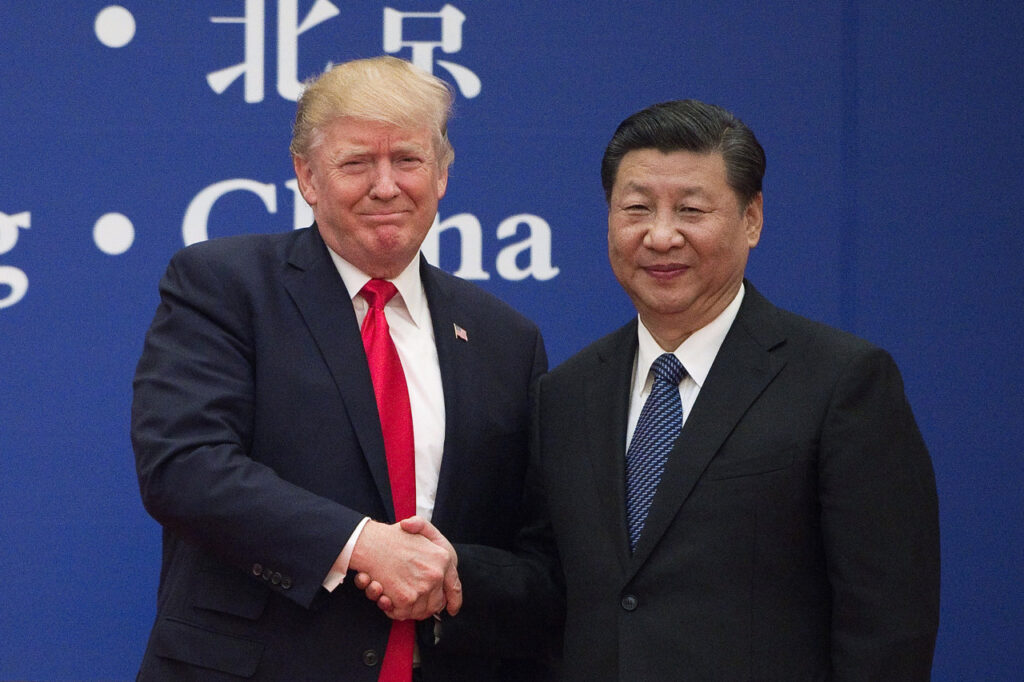China has issued a fierce rebuke to what it describes as economic blackmail by the United States, vowing to “fight to the end” in response to President Donald Trump’s sweeping tariffs on Chinese goods. The move signals escalating tensions in a trade war that continues to unsettle global financial markets and reshape international trade alliances.

On Tuesday, stock markets showed signs of stabilizing after steep declines, but investor sentiment remained shaky. The unrest was triggered by Trump’s latest threat to hike tariffs on Chinese imports to more than 100 percent, a response to China’s earlier decision to impose equivalent tariffs on American goods.
Beijing condemned the U.S. escalation as a grave error, with China’s Commerce Ministry stating that “the U.S. side’s threat to escalate tariffs against China is a mistake on top of a mistake, once again exposing the American side’s blackmailing nature.” In a strongly worded statement, China warned, “If the U.S. insists on having its way, China will fight to the end.”
While China takes a hardline stance, other nations are exploring more measured strategies. The European Union is currently consulting member states on how to respond to Washington’s aggressive trade measures, seeking a way to defend European interests without causing additional economic strain.
European Commission President Ursula von der Leyen spoke by phone with Chinese Premier Li Qiang, urging Beijing to work toward a negotiated settlement. She emphasized the importance of maintaining a fair global trading system and proposed the creation of a mechanism to monitor trade redirection that might result from U.S. tariffs.
There are growing concerns that China may redirect cheap exports originally intended for the U.S. to European markets, potentially undercutting local industries.
Chinese manufacturers, particularly in industries such as tableware and flooring, are warning of plummeting profits and exploring the possibility of relocating production overseas. As economic uncertainty deepens, financial institutions are adjusting their outlook. Citi recently lowered its GDP growth forecast for China in 2025 from 4.7 percent to 4.2 percent, citing heightened external risks and weakening global demand.
The European Union is preparing its own slate of counter-tariffs, targeting a 25 percent levy on a range of U.S. exports including soybeans, nuts, and sausages. The bloc is still open to negotiating a “zero-for-zero” deal, but frustration continues to mount over U.S. tariffs already imposed on European autos, metals, and potentially alcoholic beverages.
The intensifying tariff conflict has rattled markets worldwide. Stéphane Boujnah, CEO of pan-European stock exchange operator Euronext, said the U.S. is now beginning to resemble an emerging market rather than the dominant global force it once was. “There is a certain form of mourning,” he said in a radio interview. “The United States that we had known for the most part now resembles more an emerging market.”
While markets stabilized somewhat on Tuesday, volatility remains high. European indices rebounded from 14-month lows, oil prices recovered slightly after a sharp sell-off, and U.S. stock futures climbed marginally after incurring massive losses the previous week. Japan’s Nikkei index closed 6 percent higher, and Chinese blue chips rose by 1 percent after a steep drop the day before.
However, emerging markets like Indonesia faced significant pressure. Its stock market fell 9 percent after a trading break, prompting central bank intervention to stabilize conditions.
Nations across the Asia-Pacific region are seeking diplomatic solutions to mitigate the impact of Trump’s tariff agenda. Vietnam, heavily reliant on low-cost exports to the U.S., requested a 45-day delay in implementing new tariffs and pledged to increase purchases of American products.
Indonesia, whose currency fell to record lows, offered concessions on imports of electronics and steel to ease tensions with Washington. The country also announced it would send a high-level delegation to the U.S. to negotiate ahead of a 32 percent tariff slated to begin soon.
South Korea, meanwhile, is reviewing plans to boost U.S. imports as it prepares for bilateral discussions with the Trump administration.
Trump has defended the tariffs, which range from 10 to 50 percent on various imports, claiming they will restore America’s industrial base and correct decades of imbalanced trade. But critics warn that the sweeping measures are fueling global economic instability and pushing the world toward a recession.
As the trade standoff continues, nations are scrambling to protect their economies and recalibrate international relationships. Whether through defiance, diplomacy, or economic realignment, the global response to Trump’s tariff war is only just beginning.



